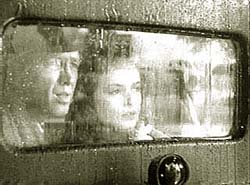 Hot Fuzz a jigsaw puzzle of cliches from some of the best cop/action/thriller/Clint Eastwood/procedural Hollywood movies stitched together. But rather than quickening an incontinent Frankenstein, this is a delightful, wry Bionic Man of an homage to the genres. Wright and Pegg have the technology.
Hot Fuzz a jigsaw puzzle of cliches from some of the best cop/action/thriller/Clint Eastwood/procedural Hollywood movies stitched together. But rather than quickening an incontinent Frankenstein, this is a delightful, wry Bionic Man of an homage to the genres. Wright and Pegg have the technology.The procedural style and direction of close up, insert shots is so conspicuously fast-paced, the sound effects so like Michael-Bay-meets-Bruce-Lee-classics that the simplest transactions - making change, for example - are a delight. By calling attention to these typically portentous or red-herring shots, the filmmakers give us a pause from worrying about their significance. We can be confident they'll return, purposefully and hilariously.
Buddy movies, we all know now, are romances without sexual consummation. At least, on screen. Take Two Weeks Notice, change Sandra Bullock into Josh Duhamel, and you've got a detective plot in the making. Take Simon Pegg and turn him into Julia Roberts (no relation), do a dialogue pass, and you've got Notting Hill. Okay, more than a dialogue pass. Hot Fuzz doesn't hesitate to play the superficially sublimated romance in the foreground, showing how these two crazy cops complete each other.
But the best quality of the movie is it's unwillingness to wink at the audience. I learned this notion from Jason Bateman, if memory serves, who explained it was Jeffrey Tambor's advice during rehearsals of Arrested Development. As an actor, he explained, the audience knows you're playing a deep, desperate idiocy. But three dimensions of entertainment flatten to two when the audience sees the character acting "as if" he were an idiot. Hot Fuzz is as committed to its comic purpose as Nick Angel, the hyper-cop protagonist, is to uncovering the true source of crime in Sanford. And it's a delight to ride shotgun.
There's a lot to be said for sincerity. Not sentiment, lazy earnestness, kids and dogs. But belief in the story and commitment to the principles of its telling. Hot Fuzz has it. Privately, I'm worried that Live Free or Die Hard doesn't. The ironic, knowing, wise cracking John McClane was so seldom sincere about anything except his family, and then he was sincerely, desperately misguided. Severance used sincerity of purpose and execution to exploit the genre. Movies I haven't liked lately have been trying to hard to be liked, including Shrek the Third. It seems we have finally reached the much discussed post-ironic period, that is, if the independents are our leading indicator. I hope so.



No comments:
Post a Comment